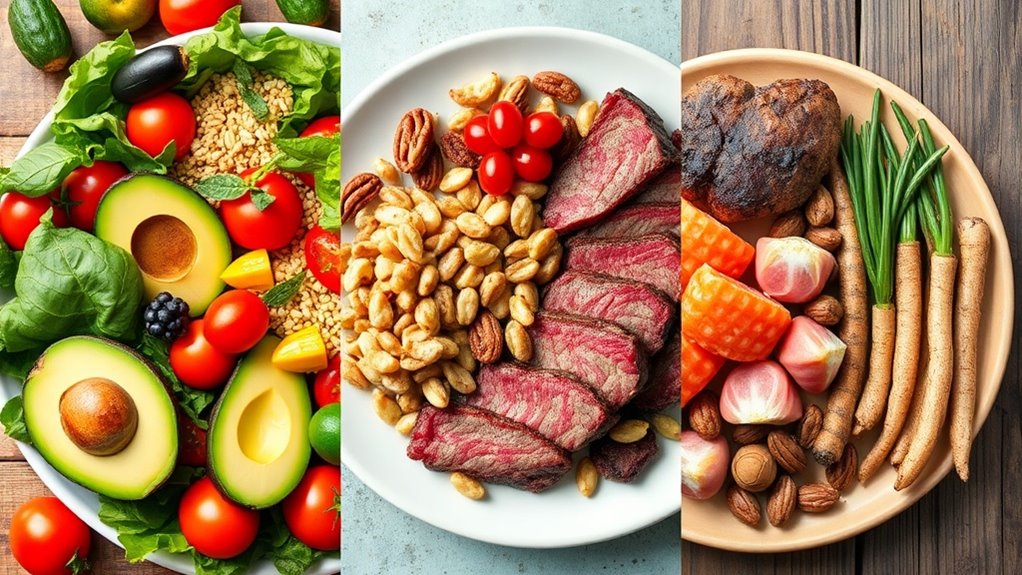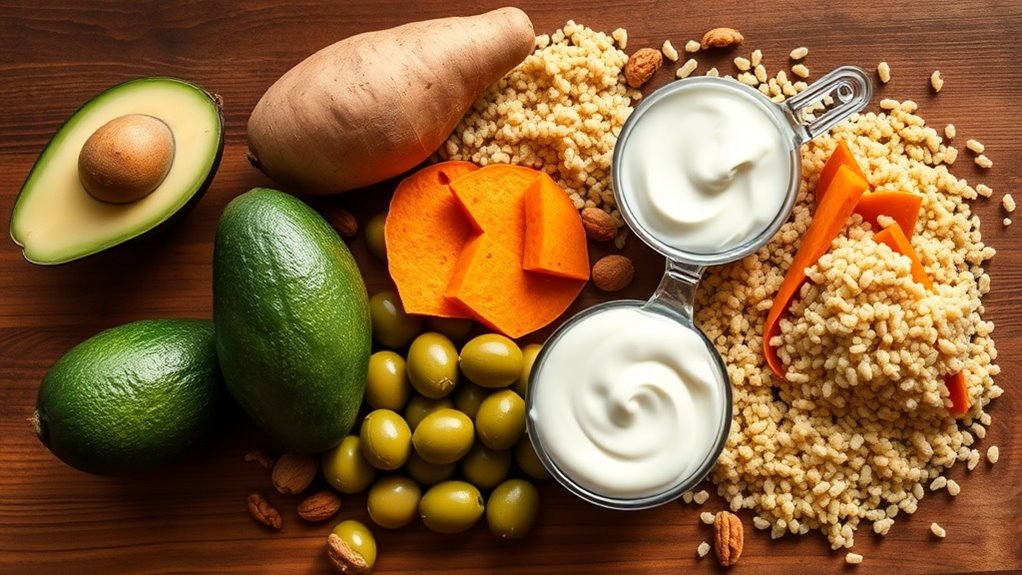Is the Mediterranean Diet the Key to Long-Term Fat Loss.
The Mediterranean Diet has gained attention for its potential role in achieving long-term fat loss. By focusing on whole foods, healthy fats, and balanced meals, it aligns with scientific principles of weight management. Many find that its emphasis on nutrition not only enhances metabolism but also promotes feelings of fullness. However, what specific components contribute most to its effectiveness? Understanding these factors can be key to achieving sustainable results.
Key Takeaways
- The Mediterranean Diet emphasizes whole foods, healthy fats, and nutrient-dense options, promoting satisfaction and reducing the likelihood of overeating.
- Rich in fiber and antioxidants, the diet supports metabolism, reduces inflammation, and aids in fat loss through improved metabolic health.
- Healthy fats from sources like olive oil and fatty fish enhance satiety, helping to manage cravings and maintain weight loss over time.
- Meal planning with seasonal produce and balanced plates of proteins, fats, and whole grains contributes to long-term weight management and health.
- Success stories highlight significant weight loss and health improvements, demonstrating the effectiveness of the Mediterranean Diet in promoting sustainable lifestyle changes.
Understanding the Mediterranean Diet Principles
What makes the Mediterranean diet a sustainable choice for long-term fat loss?
This diet emphasizes whole foods like fruits, vegetables, whole grains, and healthy fats, particularly olive oil.
By prioritizing nutrient-dense foods, you’re more likely to feel satisfied and less prone to overeating.
The Mediterranean diet also encourages moderate consumption of fish and poultry, while limiting red meat and processed foods.
This balanced approach not only supports weight management but fosters overall health.
Additionally, it promotes a lifestyle that includes physical activity and social meals, making it easier to maintain in the long run and ultimately aiding in sustainable fat loss.
The Science Behind Fat Loss and the Mediterranean Diet
Understanding the science behind fat loss and the Mediterranean diet is essential for your long-term success. The diet’s nutritional composition, rich in healthy fats and whole foods, supports efficient metabolism and enhances fat oxidation. Incorporating healthy fats into your meals can improve satiety and reduce cravings, making adherence to the diet easier.
Nutritional Composition Benefits
How does the nutritional composition of the Mediterranean diet contribute to long-term fat loss?
This diet emphasizes whole foods, including fruits, vegetables, whole grains, nuts, and healthy fats like olive oil.
These foods are rich in fiber, which helps you feel fuller longer, reducing the likelihood of overeating.
Additionally, the diet contains lower amounts of refined sugars and saturated fats, promoting better weight management.
Antioxidants from plant-based foods can reduce inflammation and support metabolic health.
Metabolism and Fat Oxidation
The Mediterranean diet not only supports nutritional balance but also plays a significant role in enhancing metabolism and fat oxidation.
By emphasizing healthy fats, lean proteins, and whole grains, this diet encourages your body to efficiently use fat as fuel. Research shows that the omega-3 fatty acids found in fish and nuts can boost metabolic rate, while fiber-rich foods promote a healthy gut microbiome, further supporting fat loss.
Additionally, the antioxidants from fruits and vegetables reduce inflammation, allowing your body to optimize its metabolic processes.
Incorporating these elements can help you achieve and maintain long-term fat loss effectively.
Key Foods to Embrace for Effective Weight Management
To effectively manage your weight, focusing on healthy fats and incorporating whole grains can be game-changers.
Healthy fats, like those found in olive oil and avocados, help you feel full and satisfied, while whole grains provide essential nutrients and steady energy.
Embracing these food groups not only supports fat loss but also enhances your overall health. Additionally, healthy fats are essential for a balanced diet, aiding in nutrient absorption and heart health.
Healthy Fats Focus
Incorporating healthy fats into your diet can greatly enhance your weight management efforts. Focus on sources like olive oil, avocados, nuts, and fatty fish, which are staples of the Mediterranean diet.
These foods provide essential fatty acids that promote satiety, helping you feel full longer. Research shows that healthy fats can improve metabolic health and support weight loss by reducing cravings.
While it’s important to watch portion sizes, embracing these nutrient-dense options can lead to better overall health. By making these choices, you’re not only aiding weight management but also nourishing your body with essential nutrients.
Whole Grains Inclusion
Embracing whole grains is an essential step in achieving effective weight management. These nutrient-dense foods are rich in fiber, which helps regulate appetite and improve digestion. By incorporating whole grains into your meals, you can experience sustained energy levels and better satiety.
| Whole Grain | Health Benefits | Serving Suggestions |
|---|---|---|
| Quinoa | High in protein | Salad, bowl, side dish |
| Brown Rice | Lowers cholesterol | Stir-fry, casserole |
| Whole Wheat Pasta | Aids in weight loss | Pasta dishes, salads |
| Barley | Regulates blood sugar | Soups, salads |
| Oats | Reduces heart disease | Breakfast, snacks |
Choose whole grains for lasting health benefits!
Meal Planning Tips for a Mediterranean Lifestyle
How can you effectively plan meals to align with a Mediterranean lifestyle?
Start by prioritizing whole, minimally processed foods. This approach not only enhances flavor but also boosts nutritional value. Here are three tips to guide you:
- Incorporate seasonal produce: Choose fruits and vegetables that are in season for peak freshness and taste.
- Balance your plate: Aim for a mix of lean proteins, healthy fats, and whole grains, like legumes and quinoa.
- Prep ahead: Spend time each week preparing meals and snacks to avoid last-minute unhealthy choices.
Additionally, adopting effective planning strategies can further enhance your meal prep and support your long-term health.
With these strategies, you’ll embrace the Mediterranean way and support your long-term health.
Real-Life Success Stories: Transformations Through the Mediterranean Diet
What happens when individuals commit to the Mediterranean diet? Many experience remarkable transformations, shedding unwanted pounds while enhancing their overall health.
Take Sarah, who lost 30 pounds in six months by swapping processed foods for whole grains, fruits, and healthy fats.
John, a busy professional, found he’d more energy and improved focus after integrating Mediterranean meals into his routine.
Research supports these stories, showing that this diet promotes weight loss and heart health.
Real-life success stories like these illustrate how adopting the Mediterranean lifestyle can lead to sustainable fat loss and improved well-being, making it a viable option for many. Additionally, mindful eating practices help prevent overeating and enhance enjoyment of food, further supporting these positive outcomes.
Overcoming Common Challenges in Adopting the Mediterranean Diet
Managing the shift to the Mediterranean diet can feel overwhelming, especially when faced with ingrained habits and lifestyle changes.
To ease the change, focus on these strategies:
- Start Slowly: Introduce Mediterranean foods gradually, like whole grains and fresh vegetables, to avoid feeling deprived.
- Plan Meals: Create weekly menus that emphasize seasonal produce, making grocery shopping more efficient and enjoyable.
- Find Support: Join a community or online group to share experiences, recipes, and tips, enhancing motivation and accountability. Embracing a sustainable lifestyle can further reinforce your commitment to this dietary shift.




